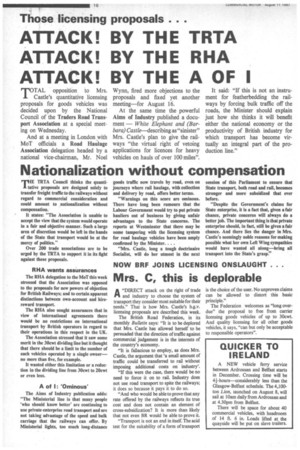Nationalization without compensation
Page 18

If you've noticed an error in this article please click here to report it so we can fix it.
TRTA Council thinks the quanti tative proposals are designed solely to transfer freight traffic to the railways without regard to commercial consideration and could amount to nationalization without compensation.
It states: "The Association is unable to accept the view that the system would operate in a fair and objective manner. Such a large area of discretion would be left in the hands of the State that transport would be at the mercy of politics."
Over 200 trade associations are to be urged by the TRTA to support it in its fight against these proposals.
RHA wants assurances
The RHA delegation to the MoT this week stressed that the Association was opposed to the proposals for new powers of objection for British Railways; and to certain apparent distinctions between own-account and hirereward transport.
The RHA also sought assurances that in view of international agreements there would be no restrictions on international transport by British operators in regard to their operations in this respect in the UK.
The Association stressed that it saw some merit in the 30cwt dividing line but it thought that there should be a limit to the number of such vehicles operated by a single owner— no more than five, for example.
It wanted either this limitation or a reduction in the dividing line from 30cwt to 20cwt or even less.
A of I: 'Ominous'
The Aims of Industry publication adds: "The Ministerial line is that many people 'who should know better' are continuing to use private-enterprise road transport and are not taking advantage of the speed and bulk carriage that the railways can offer. By Ministerial lights, too much long-distance goods traffic now travels by road, even on journeys where rail haulage, with collection and delivery by road, offers better terms.
"Warnings on this score are ominous. There have long been rumours that the Labour Government would try to put private hauliers out of business by giving unfair advantages to the State concerns. The reports at Westminster that there may be some tampering with the licensing system for road haulage vehicles have been amply confirmed by the Minister.. . .
"Mrs. Castle, long a tough doctrinaire Socialist, will do her utmost in the next
session of this Parliament to ensure that State transport, both road and rail, becomes stronger and more subsidized that ever before.
"Despite the Government's claims for State enterprise, it is a fact that, given a fair chance, private concerns will always do a better job. The important thing is that private enterprise should, in fact, still be given a fair chance. And there lies the danger in Mrs. Castle's seemingly noble reasons for making possible what her own Left Wing sympathies would have wanted all along—bring all transport into the State's grasp."












































































































